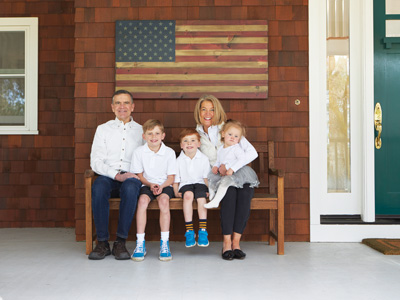How dual-career couples juggle work, family, home responsibilities.

Barrie Graham doesn’t cook. “He doesn’t even barbecue,” says his wife, Julianna Graham, with a laugh. “But I love to cook.” This is just one revealing tidbit about the Grahams, one of three dual-career couples who agreed to discuss how they balance demanding careers with home life and family time. Julianna has been in the financial services industry for more than three decades, and for the last year as senior vice president of Tri Counties Bank. Barrie is a director at Truett-Hurst, Inc., and has more than 20 years of experience in commercial and investment banking.
Barrie may not assist much with meal prep, but is the “social chairman” for the couple, who entertain  frequently at home. “I greet our guests, and I’m in charge of the wine and beer,” he says. “We enjoy working hard, but also playing hard,” says Julianna. “Because at the end of the day, what’s your legacy? Will people remember you for all those meetings you attended? You really do have to turn off work and enjoy life, but some people have a hard time unhooking from their jobs. If all you do is work, you’ll never do anything for your body, mind and soul.”
frequently at home. “I greet our guests, and I’m in charge of the wine and beer,” he says. “We enjoy working hard, but also playing hard,” says Julianna. “Because at the end of the day, what’s your legacy? Will people remember you for all those meetings you attended? You really do have to turn off work and enjoy life, but some people have a hard time unhooking from their jobs. If all you do is work, you’ll never do anything for your body, mind and soul.”
The balance to their work lives, say the Grahams, is grandchildren––ages 16 months, 5 and 7. On Friday nights they go to one of their daughter’s homes to have pizza with the little ones. They also try to schedule a “date night” just for the two of them at least once a week. “It’s probably the reverse for us compared to other couples because we stay home on date night,” says Barrie. “We go out to dinner so frequently for work obligations that when it’s just the two of us, we plan something special to do at home.”
Divide and conquer
For Darcy Barrow and Christopher Barrow, their work-centric lives underwent a major readjustment with the birth of their first child, Scarlett, who will enter kindergarten later this year. The co-founders and co-managing partners of Foundation Homes Property Management in Kentfield used to work “crazy” hours, says Darcy, then would walk their three dogs at night while continuing to discuss business.
When Darcy learned she was pregnant, she pulled back from field and sales work. “That took our company  to the next level, and business increased significantly because she could focus on managing and growing the business,” says Christopher. “It turned out to be one of the best indirect business decisions we’ve ever made.” After Scarlett was born, Darcy returned to work from a CEO approach. “I went from agent to executive,” she says. One of the biggest advantages of being business partners, says Christopher, is running their company without stepping on each other’s toes. “Darcy handles the visionary work, and I’m more on the sales side.” These days, the Barrows are usually both home by 5 p.m., unless Christopher has a later appointment. “When Scarlett entered our lives, our whole timeline shifted,” says Darcy. Being home at the same time every night to have dinner with their daughter committed them to a more regular schedule.
to the next level, and business increased significantly because she could focus on managing and growing the business,” says Christopher. “It turned out to be one of the best indirect business decisions we’ve ever made.” After Scarlett was born, Darcy returned to work from a CEO approach. “I went from agent to executive,” she says. One of the biggest advantages of being business partners, says Christopher, is running their company without stepping on each other’s toes. “Darcy handles the visionary work, and I’m more on the sales side.” These days, the Barrows are usually both home by 5 p.m., unless Christopher has a later appointment. “When Scarlett entered our lives, our whole timeline shifted,” says Darcy. Being home at the same time every night to have dinner with their daughter committed them to a more regular schedule.
But the Barrows schedule a date night every week. “We’ve been going out to dinner once a week since Scarlett was a newborn. Then on nights when we don’t have a meal service dinner to prepare, I might put something in the slow cooker,” says Darcy, whose mother babysits Scarlett nearly every Sunday.
“We realized pretty early on that, to divide up our home and family responsibilities, we both couldn’t focus on the same thing at the same time. When we divide and conquer, things get done,” says Christopher. The Barrows don’t keep a chores list, but they take on together whatever needs doing. “When I was young I worked as a dishwasher in a restaurant, so it’s ingrained in me to keep the kitchen clean,” he says. “The nanny and I handle most of the family laundry, while Darcy does most of the evening and weekend cooking.”
As the first one awake most mornings, Christopher pulls breakfast together for the family. He usually drops off Scarlett at daycare on Tuesday and Thursday, and Darcy takes her on Monday, Wednesday and Friday. Christopher has survived stage III colon cancer twice, and so appreciates his precious time with Scarlett and Darcy. “As Scarlett is growing up, I want to take advantage of our time together. Saturday is our defined daddy-daughter day, when we go do something away from the house and Darcy gets some self time to do what she wants, because she gets no time to herself during the week.”
The Barrows recommend scheduled breaks that are separate from work and separate from the family. “It might sound cliché, but it’s all in the journey,” says Christopher. “As someone who has had his butt handed to him a few times over the years, I’ve learned there is no substitute for that experience and the knowledge gained.”
Having it all?
In a recent Pew Research study, data shows that mothers are much more likely than fathers to report experiencing significant career interruptions to attend to their families’ needs. According to the study, women are most often the ones who adjust their schedules and make compromises when the needs of children and other family members collide with work.
When Scarlett needs to see the doctor or for other appointments, that responsibility tends to fall on Darcy, says Christopher. “I’m usually booked with appointments out in the field, so it’s easier for her to get away from the office.” Yet many couples have workarounds so that both parents can share in family responsibilities equally, or in the Barrows case, as near equal as possible. In addition to working full-time and raising a young child, Darcy is also active in giving back to her community, most recently as a board member of Marin Foster Care.
“I’m often asked, ‘How do you do it all?’” says Darcy. “The answer is that I outsource a lot of what is considered ‘wife’s work.’ We have a housekeeper, a nanny, a dog walker, an organic meal service for three dinners a week, a farm produce delivery service, and dry cleaning is picked up via a phone app. “I can’t be a mom and run a household and work full-time without outsourcing a lot of things. You really can’t ‘do it all.’ But with thoughtful leverage, you can have it all.” Adrienne Silver would tend to disagree. The Santa Rosa pediatrician and her husband, Bill Silver, chief executive officer of CannaCraft, put in full days at their respective jobs while working together at home to raise three sons, ages 13, 16 and 19.
“Bill and I definitely have our moments when we’re exhausted from work or stressed after a bad day. He’ll see that I need help, and hopefully I do the same thing for him. It’s realizing you can’t do it all and admitting when your energy is low.” Bill says he doesn’t need much sleep, fortunately. “My day can start at 4 a.m., and I go running every other morning,” he says. “Adrienne is doing more yoga lately, too, going to three classes a week.”
Keeping the kids fed
The Silvers love to cook together when the opportunity arises, but on work nights they use the Blue Apron meal service, and also order out via DoorDash about one night a week. Their sons also help with dinner. “The kids are mostly fine if we keep them fed,” says Bill with a chuckle. “Using technology is part of that.”
Their middle son doesn’t yet have his driver’s license, so he uses Uber frequently to meet up with friends. “That way I can get things done around the house, and don’t have to be the carpool mom all the time,” says Adrienne. “We’ve raised our kids to be pretty independent. They’ve even been doing their own laundry for years. That came about because I got tired of folding clothes.” Until last year, Bill was dean of the business school at Sonoma State University. Now he runs CannaCraft, which produces and wholesales medical cannabis products. With that career change, his work hours increased.
 “I’m go-go-go all day at work, rarely having time to sit down,” says Adrienne. “And Bill’s life right now is similar. We don’t get home at the same time, because I generally work 8 a.m. to 5 p.m. Most nights, Bill gets home between 6:30 and 8:30. He’s now an entrepreneur, and doesn’t have the same flexibility with time he once had. Before he joined CannaCraft, we discussed what the extended hours running the company would mean, and that I might have to take on more housework and parenting duties. But the kids haven’t felt any lack of parenting from their dad. He’s fully present when he’s home.”
“I’m go-go-go all day at work, rarely having time to sit down,” says Adrienne. “And Bill’s life right now is similar. We don’t get home at the same time, because I generally work 8 a.m. to 5 p.m. Most nights, Bill gets home between 6:30 and 8:30. He’s now an entrepreneur, and doesn’t have the same flexibility with time he once had. Before he joined CannaCraft, we discussed what the extended hours running the company would mean, and that I might have to take on more housework and parenting duties. But the kids haven’t felt any lack of parenting from their dad. He’s fully present when he’s home.”
Adrienne says having a demanding career while also being a mom has been challenging over the years, including the period when their eldest son, Benji, underwent treatment for leukemia as a baby. “It’s harder for women because of the mama guilt. I felt that guilt of going to work when one of the boys was sick, and I’d have to call my parents to help. My patient schedule is a month out, so it’s difficult for me to miss work. And you never outgrow the mama guilt, because your kids need you in different ways as they get older.”
The Silvers say they had many challenges as a couple that they had to work through over the years. “Life can throw a lot at you,” says Adrienne. What’s their secret to moving through the ups and downs life tosses their way? “Bill and I treat each other with equal respect, and our kids realize we got this far by supporting one another.”
Texts and greeting cards
Working in the same industry, the Grahams both understand the many pressures, deadlines and commitments that go with their line of work. “The reality of being in community banking is that many of our clients become friends, and vice versa. Social lives and business lives tend to intertwine,” says Barrie.
A typical day for the couple begins at 5 a.m., when they go to a gym together, but work out separately. “It’s how we start as many of our days as possible if one of us isn’t traveling,” says Barrie. Life used to be more complicated when they were raising three daughters. “Deciding who has to leave work to take care of a sick child––that can create problems,” says Julianna. “One of you has to go home, and there can be resentment.”
Julianna enjoys receiving fun text messages from Barrie during her workday. “It’s a nice encouragement from him, and texting is a fast and easy way to keep in touch. He also sends me greeting cards, and those are much appreciated.” Some couples, she says, need more time and distance apart to pursue their individual interests, and then can come back together in a better mood. “But Barrie and I really enjoy the interplay between our professional and personal lives. We are fortunate that way. But you can’t be a good partner or parent if you don’t take care of yourself first. You have to spend time doing that.”
Making It Work
The Stanford University Graduate School of Business conducted a workshop in 2015 that examined how dual-career couples balance work, life and family. Several “power couples” participated in the event and described the challenges of maintaining a loving relationship and a chaos-free household when both partners work long hours and also may travel frequently. Here are some of their road-tested ideas for making such relationships work:
Define your roles. The wife in one relationship spent a good deal of her career traveling, while her husband was co-founding two companies. Neither had much time to focus on home life, so they worked out an arrangement early on: She would handle the tasks that could be done remotely, such as paying the bills; he would take care of anything that needed to be done in person. Being explicit in advance about their roles assured that tasks that needed to get done didn’t fall through the cracks.
Put the relationship first. Marriages require a lot of care and feeding. Yet for many dual-career couples, the relationship is the thing that tends to get neglected, unfortunately, said one wife. “Even if you have a call pending and a flight tomorrow morning, it’s important be fully present for your spouse.” Her husband agreed: “You have to make sure that the relationship is healthy before you worry about other things.”
Outsource whatever you can. One couple experimented with a variety of care-taking arrangements for their three young children before settling on hiring a nanny who also could serve as a domestic executive assistant. Besides helping with the children, their nanny does the grocery shopping, child chauffeuring, and other routine errands.
Remember that the laundry really can wait. One couple found it helpful to lower their Martha Stewart-style standards and live in a small apartment that didn’t require a lot of upkeep. If the laundry isn’t folded promptly, it’s no big deal. “We don’t hold each other accountable for having a perfect life,” says the wife. “I don’t expect my husband to make dinner every night, and he doesn’t expect me to, either.”
Keep rituals. One couple began their relationship by taking long walks together while attending grad school. The regular outings gave them the time and space to talk about big agenda issues in their lives before they became problematic. Now married and living in San Francisco, they take walks in the city at least twice a month to check in with each other on the bigger issues. They also make a point of cooking and having dinner together frequently.
Set your limits. For couples with children, define what is important to you as a family, and then stick to it.
Have realistic expectations. People often think they know exactly what they want in a future spouse. But proceed with caution. Some men may want to marry a brilliant career woman, then might also want her to be a supermom when children enter their lives. It’s critical for dual-career couples to have an open dialogue about their expectations before marriage.
For more information, visit www.gsb.stanford.edu/insights.
Pencil In a 24/30 Plan
Many years ago, Adrienne and Bill Silver were gifted with some helpful advice from a married friend. “He and his wife had a practice they called ‘24/30,’” says Bill. “That meant that every 30 days, they spent 24 hours doing something fun together.” It might be as simple as an overnighter in Calistoga or San Francisco. When demands of job and family interfere with their 24/30 plan, the stakes are doubled to 48/60—they get to spend two full days together every 60 days. The Silvers try to stick to the 24/30 agenda whenever possible. “It was one of the best gifts of advice we ever received,” adds Bill.





